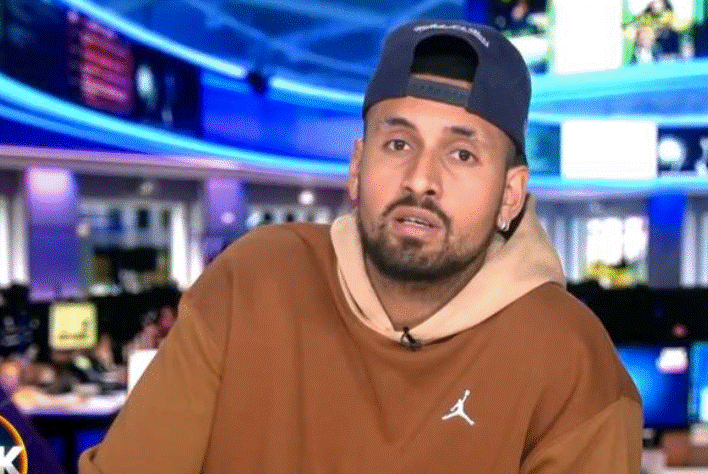Nick Kyrgios spoke openly about his struggles with mental health and thanked tennis great Andy Murray for "spotting signs of self harm" during an interview with UK broadcaster Piers Morgan.
Earlier this year, Kyrgios revealed he spent time in a psychiatric ward following a loss at Wimbledon in 2019 because of suicidal thoughts.
He went to a hospital in London to "figure out my problems" after the loss to Rafael Nadal, where he wore a compression sleeve over his right arm during his singles matches to conceal his scars.
READ MORE: Peking Duk, Hooker to light up iconic Melbourne event
READ MORE: Fuming sport in 'survival mode' after Comm Games farce
READ MORE: 'Scared of the dark': Smith hurls ball as temper boils
"I think it was just all a year and a half to two years of just complete harm. It was pretty dark, to be honest," Kyrgios said. "I won tournaments you know on the professional tour, drinking every night, self-harming.
"It was burning things on my arm, cutting myself for fun and, I had people around me saying this is not normal behaviour. I did have people around me that were caring, but it was almost the more I kept doing it, it became an addiction of love, pain.
"I hated myself. I hated waking up and being Nick Kyrgios. I hated going to places and tournaments and no one actually wanted to talk to me at face value. They just wanted me to be 'the entertainer' or the 'crazy Nick Kyrgios'. So I didn't feel like who I actually was of any worth, and it just got out of control.
Kyrgios said Murray was the one person on tour who noticed the scarring on his arm, and approached him about it.
"Andy was always a big supporter of me as soon as I came on the tour," he added.
"He was always someone that was looking out for me and wanted the best for me.
"He saw it and he said, 'Well, what's that on your arm'? And it was pretty bad at that stage … These are people in the locker room. So I'd be in the locker room and people would be able to see my self harm. So I could only imagine what people would think when they were actually versing me on the tennis court. They're like, 'Wow, this guy's mentally in a storm at the moment and he's still trying to play'.
"And it would have been alarming for some of these players to have seen it and Andy obviously was trying to give me advice on it, but I was just so stuck in my ways at that time that I didn't listen. And obviously, I'm very thankful. I thank him a lot."
The Aussie tennis player, who missed most of this year with injury, said he turned things around after having an honest chat with Murray and managed to incorporate positive changes to his life.
"At the end of the day, you can have everyone around you telling you which direction to go, but if you don't think that's the right way, then you're not going to get out of it," he said.
"And I just had a conversation with myself and I was like, 'Look, we got to do something about it'.
"So I just tried little bit, by little bit, just to get some good habits, make some right choices.
"Last year was the best year, arguably the best year of my career and nearly won a Grand Slam. I had the third best season on the planet and just from where I was to that, it was so emotional for me personally because I just didn't think it was possible.
"I thought my time had gone where I'd have success off the court and on the court. I had a great partner, I had a great friendship group and had amazing success in it. I'd never thought it was possible to be this happy, but I think that it's just more, I think, it was me just day by day making the right choices."
In February, Kyrgios apologised in court when he escaped conviction on a charge of common assault after pleading guilty to shoving a former girlfriend to the ground in 2021.
Kyrgios' psychologist, Sam Borenstein, said in a written report and testimony that Kyrgios had suffered major depressive episodes around the time of the assault and had used alcohol and drugs to cope. Kyrgios' mental health led to impulsive and reckless behaviour.
A magistrate did not record a conviction against Kyrgios for reasons including that the offense was at the low end of seriousness for a common assault, was not premeditated and he had no criminal record.
Immediately after the court ruling, Kyrgios issued a statement through a management company saying: "I was not in a good place when this took place and I reacted to a difficult situation in a way I deeply regret. I know it wasn't OK and I'm sincerely sorry for the hurt I caused."
"Mental health is tough. Life can seem overwhelming," he added in the statement. "But I've found that getting help and working on myself has helped me to feel better and to be better."
If you or anyone you know needs immediate support, contact Lifeline on 13 11 14 or via lifeline.org.au. In an emergency, call 000

Leave a Reply
You must be logged in to post a comment.